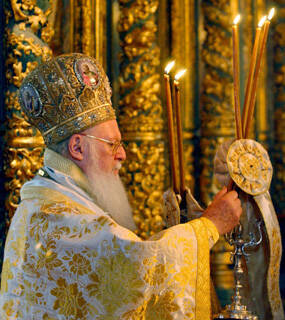Freedom for Christians
Those who are following the fits and starts of Turkey’s current attempt to enter the European Union have undoubtedly been reminded of earlier, less peaceful encounters between the Turks and Europe. The Siege of Vienna in 1529 and the Battle of Lepanto in 1571, the latter memorialized in G. K. Chesterton’s famous poem, come to mind. More recent clashes, including World War I and the division of Cyprus, also exacerbated the country’s tensions with Europe. So too has the sad experience of the Orthodox Christian Church with successive Turkish governments.
In April, Ecumenical Patriarch Bartholomew I reminded worshipers of the hanging of Patriarch Gregory V by order of the sultan in 1821, and he lamented that “in 2008 the great church of Constantinople still lives in captivity.” This captivity has included intolerance of Christianity, confiscation of property, closing of schools and the creation of a climate that has pressed Christians to emigrate.
In the past month Turkey was visited by the foreign minister of Austria, Ursula Plassnik, who took time to pay special reverence to Patriarch Bartholomew. She noted his efforts to promote interreligious dialogue and to build a better world where all can practice their religion freely. Religious freedom, she said, is one of the presuppositions for all of Europe’s values and ideals.
While there have been encouraging moves on the part of the Turkish government to advance freedom of religion, they have been limited. Much remains to be done both at the level of law and justice and at the deeper social and cultural level to provide an environment in which real freedom can be enjoyed.
An Exception in Africa
Botswana may be best known in the West through the series of novels by Alexander McCall Smith, beginning with The No. 1 Ladies’ Detective Agency. Less known is the fact that Botswana is one of the most stable nations in Africa.
On April 1 Vice President Ian Khama succeeded outgoing President Festus Mogae, who resigned. This is the fourth peaceful transition in Botswana since independence in 1966—quite a contrast with its neighbor Zimbabwe, where the outcome of last month’s presidential election is still uncertain. How different, too, from Kenya, which is still reeling from the violence that followed elections in December.
With a population of 1.8 million, Botswana is the size of Texas. The economy depends heavily on the diamond industry. Unlike many sub-Saharan countries, Botswana has not suffered from major religious or tribal conflicts. But President Khama faces many challenges. The country is Africa’s oldest democracy, yet it has been run by the Botswana Democratic Party for 42 years, imperiling the vibrant multiparty system needed for democracy to flourish. One of three adults in Botswana is infected with H.I.V., and life expectancy remains very low in spite of free antiretroviral treatment. The economy must be diversified and the high rate of unemployment and the growing gap between rich and poor reduced.
The annual celebration of Africa Day on May 25, which recalls the founding of the Organization of African Unity, is a day to recall the good as well as the troublesome news coming from the giant continent.
Hospitals on Life Support
For over a year the Georgia legislature, Fulton County officials, civic leaders in Atlanta, the local hospital association and the hospital’s own board worked to save Grady Memorial, one of the largest charity hospitals in the United States. They had good reason. Grady operates the only emergency ambulance fleet and the only Level 1 trauma center in Atlanta, a booming city of five million people. Financially, Grady has been running deeply in the red, bleeding so profusely that it nearly expired on the operating table. Just in time, a private foundation stanched the blood flow. To recover, Grady still needs multiple government subsidies and reorganization as a nonprofit.
Grady’s plight is all too common. Charity hospitals have closed in cities across the nation from Los Angeles and Kansas City to East St. Louis and Newark. Catholic hospitals, too, are burdened by the unrecovered cost of their charity care. The Grady case argues for long-term medical planning and coordinated oversight of the nation’s hospitals. It proves that both markets and governments can fail. Market forces leave both rural and urban residents without access to care. No for-profit hospital rushed to serve Grady’s million outpatients a year, because charity care is unprofitable. Therefore government must lead, beginning with local overseers, and the public should hold government accountable for assessing what hospital services an area needs versus what it has. Then it must find ways to secure the necessary care.
Luckily, Grady found a benefactor, but that is no sure thing for other institutions. The public, all of it, deserves healthy hospitals.








